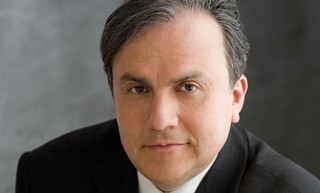|
Back
Sing It Lud, And Sing It Clear! New York
Avery Fisher Hall, Lincoln Center
06/11/2014 - & June 12, 13, 14, 2014
Ludwig van Beethoven: Piano Concertos No. 1 in C Major, Opus 15, & No. 4, Opus 58
Anthony Cheung: Lyra (World Premiere)
Yefim Bronfman (Pianist)
New York Philharmonic Orchestra, Alan Gilbert (Music Director/Conductor)

Y. Bronfman (© Dario Acosta)
Listening to Yefim Bronfman perform Beethoven’s cadenza in the First Piano Concerto opening movement, it was apparent that certain composers should never be imprisoned to an age or an era, to a “classical” or “romantic” generation. Mr. Bronfman created a volcano of sounds, rainbows of colors, another earthquake, and then ended–oh, wasn’t Ludwig the merry japester!–a tiny pinky-touching single note before the orchestra came in.
Yes, this was the start for another New York Philharmonic festival. A few world premieres commissioned by the orchestra, but essentially a festival of Beethoven piano concerti played over three weeks with Alan Gilbert and Yefim Bronfman.
Mr. Gilbert is not known primarily as a Beethoven conductor. But Mr. Bronfman, who has recorded all the concerti and sonatas and has been including much Beethoven lately, is a good friend and a frequent collaborator with the conductor. Thus, Beethoven, not exactly a stranger to Avery Fisher Hall, can be heard in all his guises by this most daring duo.
Mr. Gilbert started the First with less brio than allegro, but this simply gave Mr. Bronfman the chance to enter with a run of great power. When I mean power, I certainly don’t mean galloping away with the music. His octaves were clear, even the filigree of notes had a pulse, a strength, and after that cadenza, his final chord was a momentary return to the explosive Beethoven.
The Largo could have been a dreamy pre-Chopin nocturne, but Mr. Bronfman never let retards become pauses. As for the final rondo, this is where Bronfman, Gilbert and Beethoven, like nice musicians, simply want to have fun. It was bumptious, rocked with rhythms, and, rather than a showcase for the soloist, became a show of gorgeous showy music.
To repeat, Mr. Bronfman didn’t play this as “classical” or “romantic”, but by the first four measures of the Fourth Concerto, one realized that Beethoven had traveled far over six years. Rather than the Titan of the piano, he now became the inventor of the concerto! What right did Beethoven have to open solo in G major, then give the soloist a rest while the orchestra totally changed the key?? Why did he supposedly devise a whole drama for a short slow movement?
Whatever it was, this Fourth is the most tranquil of the works, and Mr. Bronfman played with all the pellucid beauty of tone and clarity of conception which it deserves. That second movement–the alleged mini-story of Orpheus charming the savage beasts–finally gave Mr. Gilbert a chance to vie with the pianist. His orchestral barks were raw, hard-nosed, savage. Mr. Bronfman’s sweet reply was not saccharine. He hid his sword beneath the velvet glove, and by the end of the movement, Mr. Gilbert’s roiling orchestra was tamed to the temperament of a cocker spaniel puppy.
Seemingly as if he had just entered the concert hall, Mr. Bronfman played the finale with the same freshness, joy and triumph as the finale of the First Concerto.
Two more weeks of Bronfman, Gilbert and Beethoven? The mind is elated.
The Fourth Concerto was the impulse for Anthony Cheung’s Lyra (New York Philharmonic Commission), a 20-minute work which tried to encompass not only Beethoven’s Orpheus but strains from Monteverdi, Gluck (and possibly, though I didn’t catch it) Stravinsky’s Orphée. The piece was equally challenging in its quarter-toned instruments, its electronic voices, its replicas of lyres through Asia and Africa, and–finally–his own technically brilliant original orchestration.
I had heard Mr. Cheung’s Fog Mobiles previously, taken from full to chamber orchestra, and was duly impressed with his technique. In Lyra, I personally found thickness, a plethora of notes and quotes whirling through what seemed far longer than 20 minutes.
One can’t help but be impressed by this Wundermittelkind, for he is a daring and audacious composer. At the same time, I wanted just a glimpse, a scintilla clarity, of sunlight, of the native resonance from the millennial-old lyre itself.
Harry Rolnick
|